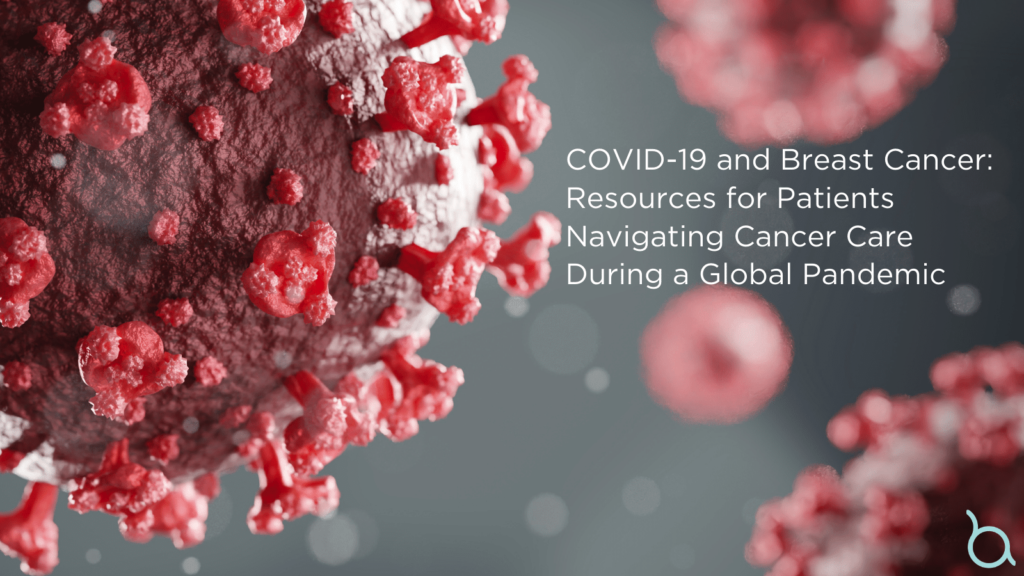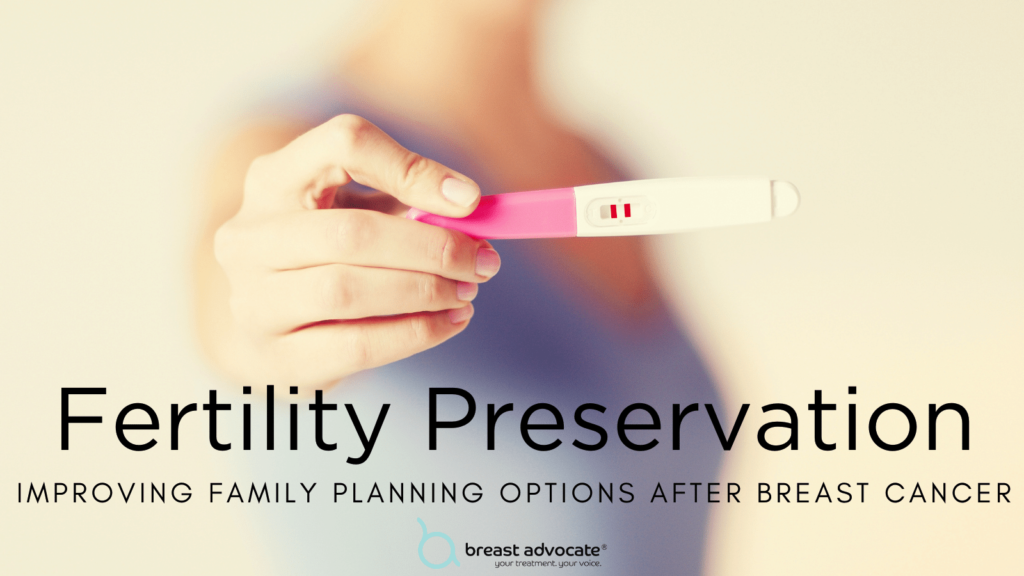Resources for Navigating Breast Cancer Care During the COVID-19 Pandemic

The COVID-19 pandemic has impacted everyone across the globe. Confusion, fear, and safety protocols continue to make navigating breast cancer screenings and treatment more difficult than ever. Although data and recommendations are constantly evolving, we present some helpful information below to address the most common questions we see relating to breast cancer care during the pandemic.
Breast Cancer Screening
Leading health organizations and medical professionals agree it is safe to resume breast cancer screening. The importance of resuming annual screenings and/or diagnostic imaging tests cannot be understated. With safety protocols in place at every medical facility, patients can more confidently go to these appointments as long as they adhere to the recommended guidelines, such as wearing a face mask/covering and physical distancing as much as possible.
Treatment Options
Many patients today are reporting delays in their breast cancer surgery due to the limitations in place within hospital systems. These limitations help ease the burden on the healthcare system created by COVID-19. The impact of these delays has raised obvious concerns from patients and medical professionals alike.
Luckily, more hospitals and surgical centers are opening up and breast cancer surgery delays are becoming less frequent. Currently, treatment options like chemotherapy and radiation are continuing as normal and patients should follow their healthcare team’s recommendations.
As a helpful resource, the American Society of Breast Surgeons has published recommendations to help guide physicians and their patients through the common scenarios related to breast cancer treatment during the COVID-19 pandemic.
COVID-19 Vaccines
Vaccine distribution regulations vary by state, but in many areas breast cancer patients are eligible to receive the vaccine now. Before receiving the COVID-19 vaccine, patients should consult with their medical team.
There’s a lot of confusion among breast cancer patients as to whether the vaccine is a good idea or a bad idea for somebody undergoing treatment. Reports of lymph node swelling after a vaccine that mimicks breast cancer spread (metastasis) has obviously caused a lot of concern. However, this should not be mistaken for disease progression. It is also very understandable for some of you to feel uncomfortable receiving a vaccine that is so new and has been developed so quickly. However, please know that new vaccines cannot be released for public use without the appropriate safety protocols being followed.
Breast Reconstruction Timing
For many, breast reconstruction has had to be rescheduled or postponed due to their local hospital infection rates and bed capacities. This can be extremely frustrating to say the least. However, please know that delayed reconstruction is still possible any time after a mastectomy (or lumpectomy).
For current scheduling availability and recommendations in your area, please keep in close touch with your plastic surgery team.
Related content:
Coronavirus: What Breast Cancer Patients Need To Know
The Impact of COVID-19 on Breast Cancer Treatment
Breast Advocate Founder Answers Your COVID-19 Breast Cancer and Breast Reconstruction Questions
Rescheduling Elective Breast Surgery After COVID-19
COVID-19 Patient Outcomes After Breast Cancer Treatment
Fertility Preservation Before Breast Cancer Treatment Improves the Likelihood of a Healthy Pregnancy After a Breast Cancer Diagnosis

A common concern for many young women following a breast cancer diagnosis is the impact cancer treatment may have on their ability to have children. Certain cancer therapies like chemotherapy and radiation can greatly impact a woman’s ability to get pregnant and have a healthy pregnancy, but fertility preservation before breast cancer treatment may help.
A Swedish study published in JAMA Oncology found that fertility preservation at the time of a breast cancer diagnosis can increase the likelihood of a healthy pregnancy and birth after breast cancer treatments.
According to the National Cancer Institute, fertility preservation is “a type of procedure used to help keep a person’s ability to have children. A fertility preservation procedure is done before a medical treatment that may cause infertility, such as radiation therapy or chemotherapy. Examples of fertility preservation procedures include sperm banking, egg freezing, in vitro fertilization with embryo freezing, and certain types of surgery for cervical and ovarian cancer.”
The Swedish study followed 425 women with breast cancer who underwent fertility preservation between 1994 and 2017. The study control group consisted of 850 women diagnosed with breast cancer who did not undergo any fertility preservation. The results showed that 22.8% of women who had fertility preservation had at least one healthy pregnancy and birth following their breast cancer diagnosis, compared to 8.7% of women who did not have a fertility preservation procedure.
The women who opted for fertility preservation also reported having more children compared to the control group at 5 and 10 year follow-up.
It is important for women who may want to expand their families following a breast cancer diagnosis to be aware that cancer treatment may lead to infertility. Likewise, it is important for women and their doctors to engage in informed shared decision-making conversations to determine if fertility preservation options may be beneficial for future family planning.






